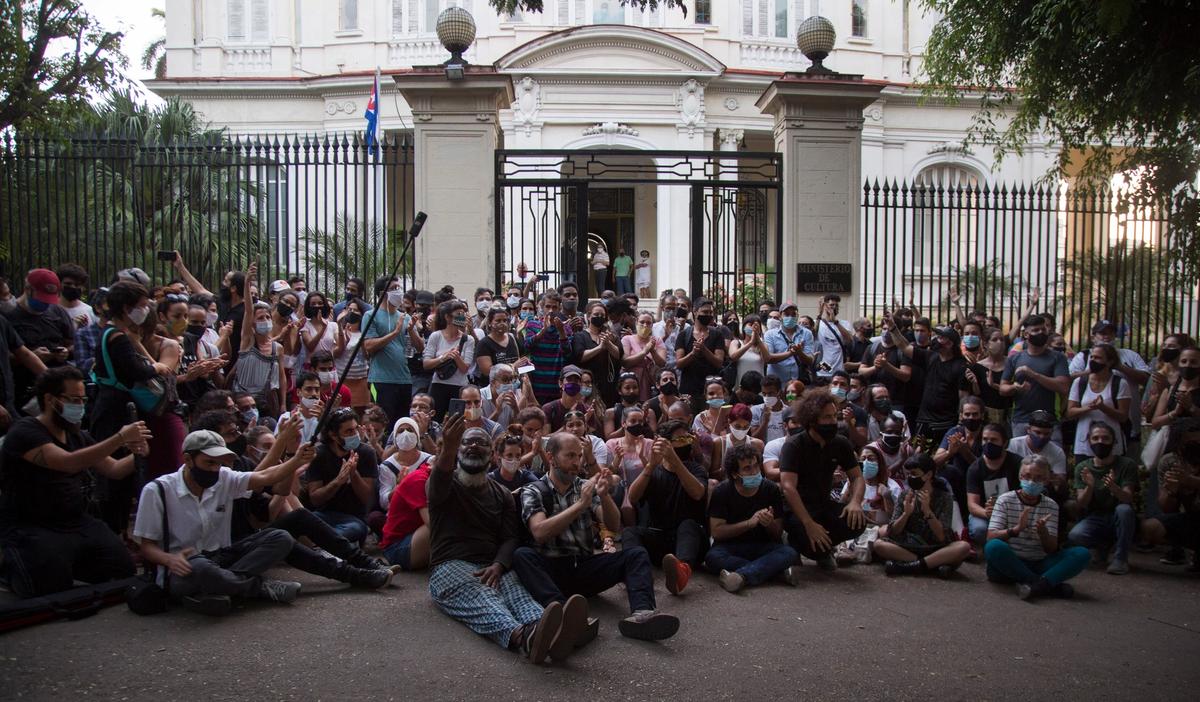The writer Hans Magnus Enzensberger once said of culture’s soft power that it is “like dropping an Alka-Seltzer into a glass—you don't see it, but somehow it does something.” Unless, that is, you are the artist Luis Manuel Otero Alcántara and the Cuban art collective San Isidro Movement, who have turned a hunger strike and standoff against the Cuban government into a fight for free speech that is getting the world’s attention.
Early this morning Otero confirmed in written messages and recorded voicemails sent to The Art Newspaper that he had been released by authorities after ending his hunger strike. Otero Alcántara said he was healthy and staying at a friend’s house in the Cuban capital after finding the headquarters of the San Isidro Movement, which was also his home, destroyed by police. The artist adds that he has been “buoyed by all the support the movement has received in the last weeks,” and “more committed than ever to work for freedom from the place of art in Cuba, which right now means the immediate release from prison of our brother Denis Solís”. Just hours later, after leaving his friend’s home to lead another protest with hundreds of other demonstrators, Otero Alcántara was once again detained by authorities, and then returned to his grandmother’s home, which he was ordered not to leave, the artist told the Miami Herald. Other members of San Isidro are under a similar de facto house arrest, he added.
Otero Alcántara and dozens of members of the movement have spent years denouncing the Cuban government’s anti-free speech statute, known as Decree 349, and over the past several weeks have been protesting against the arbitrary detention and imprisonment of one of their own, the musician Denis Solís González. The rapper’s summary sentencing to eight months in prison for the crime of “contempt”—he stands accused of confronting a police officer who entered his home without a warrant—triggered a series of escalating public actions by the movement and reactions from the Cuban state.
On 18 November, five members of the San Isidro Movement went on hunger strike. A little over a week later, Cuban authorities raided the group’s headquarters and arrested the strikers, Otero among them. Since then, declarations of support for the movement’s free speech goals have come in from around the world, including statements from the US Secretary of State Mike Pompeo and the government of the European Union, as well as from local figures, such as the Cuban actor Jorge Perrugorría.
But despite the international attention, the Cuban government does not seem to be backing down from its retaliations. After a historic meeting on 27 November between the deputy culture minister Fernando Rojas and a group of protestors, which included the artist-activist Tania Bruguera, during which the official reportedly promised future discussions about artistic freedoms, Cuba’s president Miguel Diaz Canel completely reversed course over the weekend, saying the protests were a "farce" and an "imperialist reality show" instigated by the US. And according to an open letter published by the artist Coco Fusco, Bruguera was threatened by state security agents on Wednesday morning for her role in the meeting, while the Cuban journalist Carlos Manuel Alvarez is being demonised by the state media. “These intimidation tactics are likely to be a prelude to formal charges being brought against both of them as well as others, followed by arrests and possible imprisonment,” Fusco warns, calling on American foundations, museums and newspapers to speak out about the situation.
“After eight days of hunger strike and four days in jail I’m immensely gratified to see the support we have received locally and internationally. It does a body good,” Otero told The Art Newspaper early on Wednesday. “Nevertheless, we are cognisant of the extra responsibility that now rests on our shoulders. I’d liken the current success of the San Isidro Movement to having a child. There’s a before and after. Now we have to take care of and nurture that child.”


